|
(1)Ramie (Boehmeria
nivea (L.) Gaudich.) is subject
to Urticaceae, Boehmeria spp.,
nicknamed as Cannabis sativa,
Jews Mallow, and Abutilon; Truku
called it as kri.
Boehmeria frutescens Thunb is subject to
semi-shrub, with stick straight
and about 2-2.5m in height, the
stick of which presents green if
immature and turns to brown
mixed with russet if mature. Its
alternate leaves are accompanied
with stipule, which is wide and
shaped like egg gradually from
one tip to sharp end, with leaf
base from heart-shape to
truncation, leaf edge as blunt
sawtooth, leaf color as dark
green, and white floss covering
the leaf back. The red flower is
unisexual but monoecism,
distributed and cultivated
around plain fields, with female
flower growing close the stick
end and male one under it.
   Check
the face and back of a
leaf Check
the face and back of a
leaf |
   The
leaf alternates The
leaf alternates
|
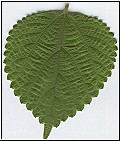 |
 |
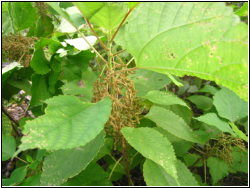 |
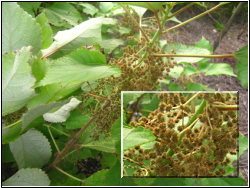 |
(2)During the
process experiencing peeling off
stick cortex to get ramie yarn,
we once discovered a varietal
ramie - Boehmeria nivea (Boehmeria
nivea (L.) Gaudich. var.
tenacissima (Gaudich.) Miq.),
subject to Urticaceae and
Boehmeria spp., named as kri
longai (Monkey ramie) by
clansman as extracted yarn
breakable.
Boehmeria nivea belongs to erection or climing
frutex, with dense floss and
shag growing in stick. Its
leaves alternate, with
significant aberrance in shape,
size, coating stuff and sawtooth
at leaf edge; the wide leaf,
covered with white floss on the
back, is shaped like egg with
length as 4-18 cm and width as
2-13 cm, starting trend of
gradually acuate from one end to
the tail, cuniform base
approximating truncate in shape,
and blunt sawtooth at leaf edge
extending to the tooth fringe;
stipule base closes up,
characterized as caducity. The
green flower is unisexual but
grows with monoecism, with
female flower growing close the
stick end and male one under it.
Its fruit is achene and flat
ellipse in shape, generally
growing along the road and woods
edge in places of middle
altitude.
   Ramie
of same kind
(usually called as
Money ramie) is easy
to be confused with
those clansman uses
in weaving. Ramie
of same kind
(usually called as
Money ramie) is easy
to be confused with
those clansman uses
in weaving. |
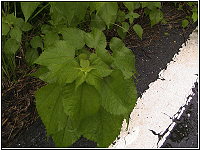 |
 |
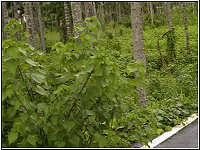 |
 |
| |
|
   This
is ramie woven by
clansman. This
is ramie woven by
clansman. |
 |
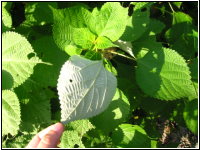 |
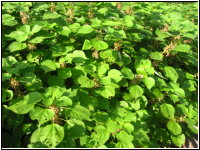 |
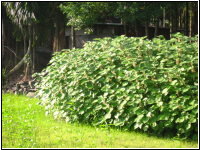 |
(3)Purpose:
Stick fibre can be processed to make rope or
weave cloth, once widely
cultivated in Asian countries as
an important material of flax
before invention of artificial
fibre. The tender stick can be
fried or cooked as food after
burned by hot water. Pestle
tender leaf, cook with sugar
water, and rub them with sticky
rice powder to make grass cake
that tastes with light scent.
The ramie root with sugariness
also can cook as food,
functioning medically to cool
blood, cease blood flow,
clearing heat, stablize embryo,
and help diuresis and
detoxifcation, etc.
Source:
Vascular Bundle Plant Database,
Taiwan (2007.02.28),
http://biodata.tesri.gov.tw/wildplant/
Taiwan Vascular Bundle Plant
Introduction, Volume 2
(2007.02.28),
http://163.20.110.141/ccg03/veg/2/index-1.htm
  |